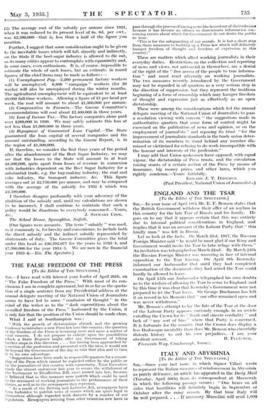THE FALSE FREEDOM OF THE PRESS
[To the Editor of Tim SPECTATOR.] SI 12,-1 have read with interest your leader of April 26th, on " The False Freedom of the Press." With most of its con- clusions I am in complete agreement, but in so far as the quota- tion of a single sentence from my Presidential address at the annual delegate meeting of the National Union of Journalists seems to have led to some " confusion of thought " in the mind of the writer as to the " dark superstitions about the so-called freedom of the Press " harboured by the Union, it is only fair that the position of the Union should be made clear.
What I said at Southampton was :
" With the growth of dictatorships abroad, and the growing tendency to introduce a new Press law into this country, the question of the freedom of the Press is becoming more and more a matter of vital concern. I do not propose to enlarge upon the possibilities which a State Register might offer any Government of taking farther steps in this direction . . . but having been approached by a section of the profession and presented with the idea, it would not be beyond the Government of the day to take that idea and to turn it to its own advantage. "Suggestions have been made in responsible quarters for a censor- ship of the Press which cannot be regarded either by the public or by the journalists of this country with equanimity. Your Executive made the utmost endeavour last year to secure the withdrawal of the Incitement to Disaffection Bill, since passed into law, because it believed that in this measure were powers which could be used to the detriment of working journalists in the performance of their duties, as well as to the newspapers they represent. " As a result of the Betting and Lotteries Act, newspapers have been forbidden to publish news of events which are quite legal in themselves although regarded with -distaste by a number of our legislators. Newspapers arriving from other countries now have to pass through the process of having news blackened out of their edit ions because it has become an offence to disseminate information con- Corning events about which the Government do not desire the publio to hear.
"This is for the safeguarding of our morals. It is but a short step from these measures to building up a Press law which will definitely hamper freedom of thought and freedom of expression in this country."
These are matters which affect working journalists in their everyday duties. Restrictions on the collection and reporting of news and views, not anti-social in themselves, are a denial of the right of the " free access of the people to true informa- tion " and must react adversely on working journalists. The two measures recently introduced by the Government may not be regarded in all quarters as a very serious step in the direction of suppression, but they represent the insidious beginning of a form of censorship which may hamper freedom Of thought and expression just as effectively as an open dictatorship.
These were among the considerations which led the annual delegate meeting of the National Union of Journalists to pass a resolution viewing with concern " the suggestions made in
authoritative quarters that some form of control might be exercised on the publication of news and opinion, or on the employment of journalists " and reposing its trust "for the improvement of journalistic standards in the trade union deter- mination of its members to stand behind any member dis- missed or victimized for refusing to do work incompatible with
the honour and interests of the kofession."
I may add that Union spokesmen have opposed, with equal vigour, the dictatorship of Press trusts, and the circulation raising stunts of a certain section of the Press by means of insurance, big money prizes, and other lures, which you rightly condemn.—Yours faithfully,
EDWARD J. T. DIDYMUS.
(Past President, National Union of Journalists.)














































 Previous page
Previous page